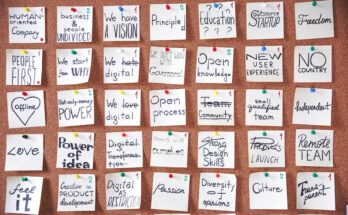In 1969, I was seven years old and largely oblivious to the historical events happening around the world.
Neil Armstrong stepped onto the moon, half a million people came to Woodstock to hear Jimi Hendrix, and the Stonewall riots kicked off the gay liberation movement.
That same year, 50 years ago, a less well-remembered event in Stockholm arguably shaped our world today even more. And not for the better. The King of Sweden presented with royal pomp the first-ever Nobel medals in economics. The fallout from that is the theme for our eleventh issue.
The so-called Nobel Prize in Economic Science is a case of doubly mistaken identity that could be worthy of a Shakespearian comedy if the real-world impacts were not so tragic. First it’s a mistake to call it a Nobel Prize – as it was created and funded by the Swedish Central Bank three-generations after the Alfred Nobel’s family set up the real prize in his name to celebrate great work in science and medicine. And it’s a mistake to cast economics as a science in the same way as physics.
And? You may ask.
Writing as the global financial crisis was trashing balance sheets and economists’ reputations, former trader and Black Swan author Nassim Nicholas Taleb had an answer.
Every time he’s criticised the fake assumptions behind financial market theory, which lead to the crisis, he wrote: “I have been abruptly countered with: “they have the Nobel”, which I have found impossible to argue with.” He concluded that “the prize is not just an insult to science; it has been putting the financial system at risk of blow-ups”.
And, it’s not just left-wing thinkers who’ve criticised the Nobel prize in economic science. Friedrich von Hayek, Margaret Thatcher’s favourite economist, said he had not thought it a good idea: “One reason was that I feared that such a prize… would tend to accentuate the swings of scientific fashion. [Another is] that the Nobel Prize confers on an individual an authority, which in economics no man ought to possess.”
“The Nobel Prize confers on an individual an authority, which in economics no man ought to possess.”
What’s even more remarkable, he said that at the Nobel banquet after having received the prize, which his biographer says rescued his reputation and his conservative cause from relative obscurity.
If you’ve seen our social media recently, you’ll know that we’ve created a democratic alternative: the #NotTheNobel Prize, and it’s been a great pleasure to see nominations pour in from around the world, including some people who are new to me. We will be announcing the winner at the end of a live-streamed event on 3 October following lively discussion of the finalists and live online voting. I can’t wait.
We have some prize-winning articles for you in this issue. For the low-down on the “fake” Nobel that helped neoliberalism conquer the world” check out Christian Felber’s article. Of course, there have also been some really great winners of the Nobel: Ulrich Volz explains why he thinks Stieglitz is one of them while André Pedersen Ystehede and Stefan Kesting tell the fascinating tale of Schelling and his multiple talents.
We also focus in this issue on economic development as arguably economic theory has caused most damage in the global south. We have an interview with Kenyan economist Mwangi wa Gĩthĩnji on African economic policy, and articles from Alessandra Mezzadri on sweatshops and Ingrid Harvold Kvangraven and her collaborators on dependency theory.
Ethics and values may have been chased out of the debate in top ranking economics journals, but not here. Listen to our interview with Jonathan Aldred on his book Licence to be Bad.
And as this issue is not a bland monoculture… also check out Rita Samiolo on rankings, Nick Robins on how finance should deliver a just transition, and Andrew Black on the “hero” chief executive, Paul Polman. We also discover from Georgina Silvester why Handelsbanken, lauded by John Kay, is different.
And of course our regular columns with Verity contemplating whether it is her year for a Nobel, the Outsider looking at what financial services the poor really need and our A level teacher reflecting on teaching the elite’s offspring development economics.
So do enjoy, join the #NotTheNobel online discussion and please do help us find fresh economic thinking for the 21st century.


